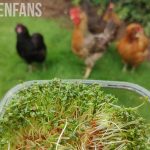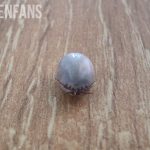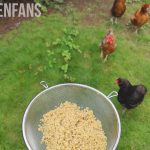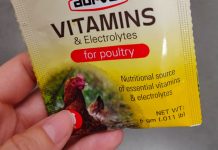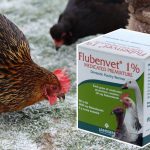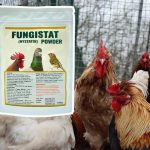Can Chickens Eat Tomatoes? (Tomatine Poisoning)
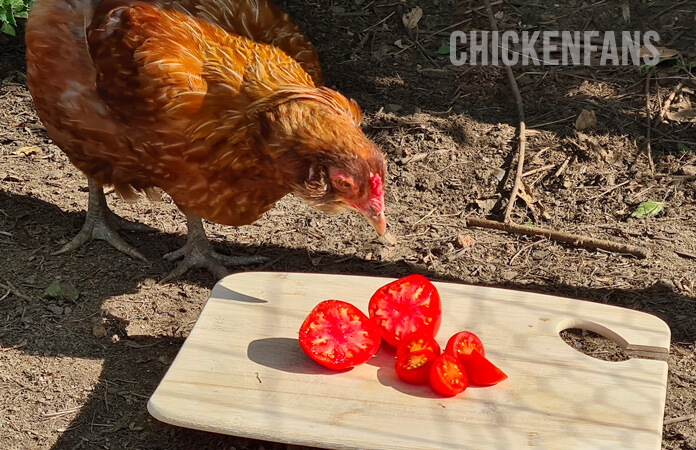
Chickens can eat ripe tomatoes in moderation, but not the leaves and stems of the tomato plant.
We’ll discuss tomatoes as a food source for chickens, how to feed your birds tomatoes correctly and what to avoid.
- Can chickens eat tomatoes?
- Nutritional Value of Tomatoes for Chickens
- Benefits of Tomatoes for Chickens
- Tomatine Poisoning in Chickens
- Symptoms of Tomatine Poisoning in Chickens
- Effect of Tomatoes on Growth and Laying Performance
- How many tomatoes can a chicken eat?
- Ripe vs. Unripe Tomatoes for Chickens
- Summary
Can chickens eat tomatoes?
Adult chickens can eat one small red tomato daily as a treat. They can not eat the leaves or stems of the plant, nor can they eat unripe green tomatoes. Baby chicks or breeding hens should never eat tomatoes. Tomatoes contain tomatine, a poison causing diarrhea, stomach upset, and weakness.
Nutritional Value of Tomatoes for Chickens
Tomatoes are 95% water and don’t bring many macronutrients to the table. They contain almost no carbs, fats, or proteins. Although most people consider tomatoes a vegetable, botanically it’s a fruit, and most calories come from sugar.
| Small Tomato (100g) | Amount | % DV Laying Hen |
|---|---|---|
| Calories | 19 kcal | 6% |
| Water | 95 g | – |
| Protein | 0.7 g | 0.04 % |
| Carbs | 3.84 g | – |
| Sugar | 2.6 g | ~ 6.5 % |
| Vitamin C | 17.8 mg | ~ 15% |
| Vitamin A | 24 µg RAE | ~ 0.1% (80 IU) |
| Potassium | 193 mg | ~128% |
| Lycopene | 2860 µg | – |
| Folate (vitamin B9) | 10 μg | ~2% |
| Calcium | 10 mg | ~1% |
They do come with a couple of micronutrients:
- Lycopene – an antioxidant that reduces oxidative stress, heart diseases, and cancer. Tomatoes are a dietary source of lycopene. No daily value requirements are specified for chickens (or even humans).
- Vitamin C – an antioxidant that’s vital for tissue growth and blood vessels. It’s involved in many body functions and the proper functioning of the immune system.
- Potassium – an essential mineral, but potassium is present in most feed sources for chickens.
Although tomatoes have traces of other vitamins, the concentration is really low. For example, 100g of tomato only contains 7.9μg vitamin K, which is not even 1% of the 2mg laying hens need daily. Tomatoes also only contain about 1% of the calcium hens need. There are many better calcium sources for chickens.
Benefits of Tomatoes for Chickens
Lycopene is linked to reduced risk of heart diseases, blood clotting, and cancer, lower (bad) cholesterol, and lower inflammation.
The main health benefits of tomatoes come from vitamin C, high levels of the antioxidant lycopene, and potassium.
The highest concentrations of lycopene can be found in processed tomato products, like tomato paste, sauce, and ketchup. However, ketchup and processed food generally contain too much sugar and are not good food sources for chickens.
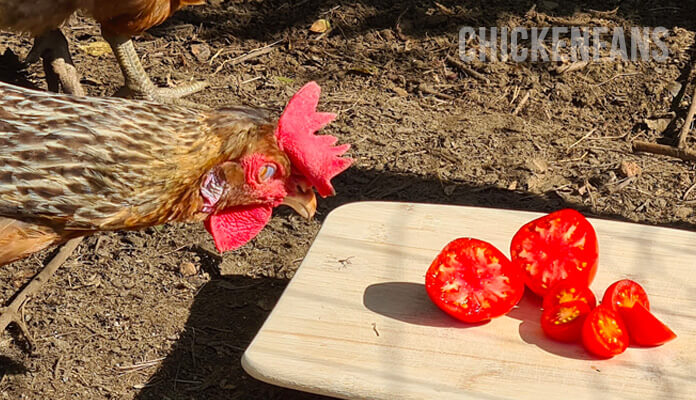
Tomatine Poisoning in Chickens
Tomatoes belong to the nightshade family of plants that contain toxic alkaloids. The most famous are potatoes containing toxic solanine, causing solanine poisoning.
Tomatoes do not have a high concentration of solanine like potatoes but contain slightly less toxic tomatine. Unripe tomatoes, however, still hold a considerable amount of solanine.
The stems and leaves of the plant contain the most tomatine. The tomato plant produces this toxic compound to protect itself against fungi and insects. Green or unripe tomatoes have higher amounts of tomatine and should never be fed to chickens.
Effects on chickens
Scientific research reports malformation in chick embryos due to the adverse effects of small doses of tomatine from tomato leaves. At high concentrations, none of the eggs hatched. Breeding hens that are kept for fertilized eggs should stick to a regular diet and avoid tomatoes.
New York Times writer Harold McGee reports that a human would probably have to eat over half a kilogram of tomato leaves to ingest a toxic (not lethal) dose. This would correspond to an ounce of tomato leaves for an 11-pound Leghorn pullet.
Symptoms of Tomatine Poisoning in Chickens
There are only a few scientific studies of tomatine on animals, but the symptoms are similar to the symptoms of solanine poisoning.
Symptoms of tomatine poisoning in chickens are:
- diarrhea
- abdominal pain
- general weakness
The highest concentration of tomatine is in the leaves and the stem. An unripe, completely green tomato has the highest amount of alkaloids and should be avoided.
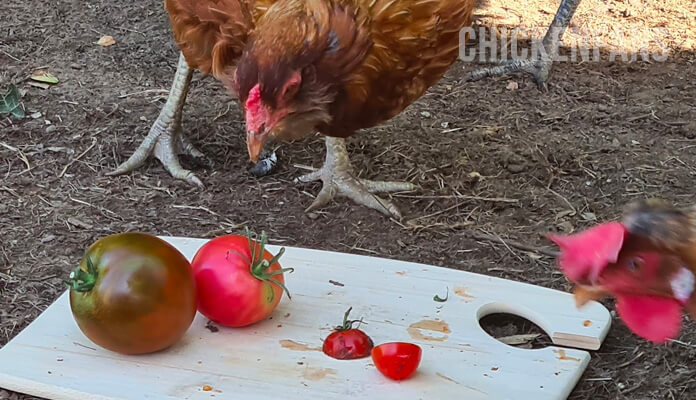
Tomatoes themselves also contain tomatine. If you feed chickens too many tomatoes, they get diarrhea and stomach upset, affecting their digestive system.
Effect of Tomatoes on Growth and Laying Performance
There has been some research regarding the positive benefits of lycopene in tomatoes on chicken eggs and growth. Researchers use tomato paste high in lycopene as an additive to the hen’s diet.
The effect of lycopene in tomatoes on chickens is interesting:
- Lycopene extract in the diet enhances the oxidative stability of fresh eggs
- Lycopene supplementation reduces the negative effects of cold stress on performance in broiler chickens
- Lycopene supplementation has a positive effect on the blood plasma and meat quality of broiler chickens
Lycopene is a carotenoid that’s present in many vegetables with red pigments, such as grapefruits, sweet pepper, strawberries, and tomatoes. Tomatoes, tomato skins, and processed tomato food are rich sources of lycopene.
How many tomatoes can a chicken eat?
Adult chickens can eat a small, ripe, red tomato without any of the effects of tomatine poisoning, but never the stems or leaves of the tomato plant. No toxic dose will kill a chicken; overfeeding will only cause diarrhea and upset. Chicks or chickens used for breeding can not eat tomatoes.
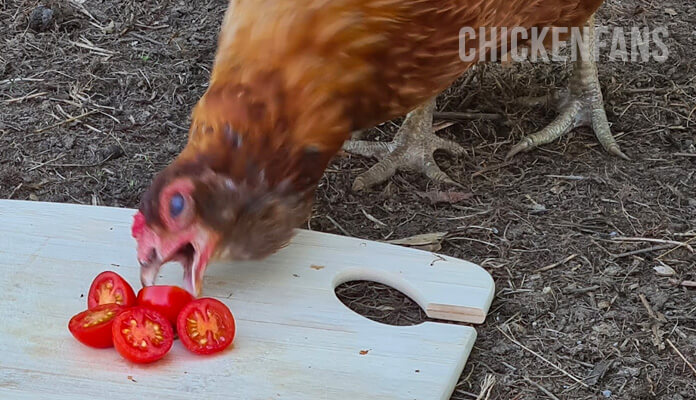
Tomatoes should be considered a treat. Besides vitamin C and lycopene, they are not a good food source for chickens. Most of the calories come from the sugar in tomatoes. Too many tomatoes will result in digestive problems and diarrhea.
You can feed your birds with tomato table scraps, but you can’t exaggerate.
Ripe vs. Unripe Tomatoes for Chickens
Chickens should only eat ripe, red tomatoes. When tomatoes are still green and unripe, they contain solanine, a toxic compound. The tomatine and solanine will wreak havoc in the digestive system and cause stomach upset, intestinal problems, and diarrhea.
You should also not feed your chickens any over-ripe tomatoes with mold growing on them. Mold is always a no-go.
Summary
Adult chickens can eat tomatoes in moderation, but it’s not a very good food source. Any unripe, green tomatoes should be avoided, just like the stems and leaves of the plant.
The positive health effects of tomatoes can be linked to high levels of lycopene, an important antioxidant. Tomato extracts are used to generate lycopene feed additives.
However, tomatoes also contain tomatine, which is a slightly toxic substance. That’s why chickens can’t eat too many tomatoes, or they will get diarrhea and an upset stomach.
Tomatine can also cause malformed embryos. Chicks and breeding hens should not eat tomatoes. Tomatoes from table scraps should be considered a treat.
If you want to learn more about chicken feed, please consult our ‘Chicken Food Page‘ to go and see every specific food article we address, including all articles on what chickens can and can not eat. Or go to our listicle food summary on ‘The Classroom‘.
Further Reads
Other fruits:
- Can chickens eat grapes – discusses grapes, their sugar and alcohol content
- Can chickens eat mango – discusses another sweet fruit
Some frequently asked questions:
- Can chickens eat cucumbers – tomatoes and cucumbers go hand in hand
- Can chickens eat and taste spicy food – here, we discuss the taste of chickens
- Can chickens eat onions – the risks of feeding onions and their use as poultry supplements
- Can chickens eat chocolate – several variants of chocolate are toxic to chickens
Some articles we mentioned here:
- The chicken digestive system – how chickens digest their food
- The chicken respiratory system – how chickens breathe and why it’s so different from how we breathe

